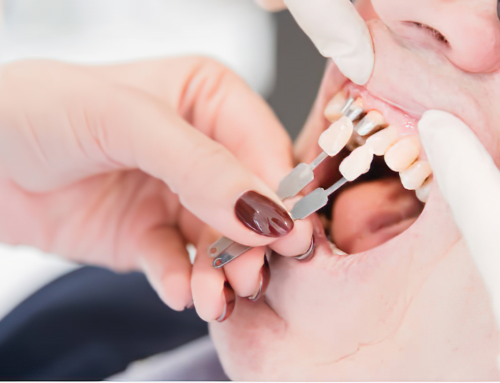What are Dental Implants and How Do They Work?
Dental implants are a revolutionary solution in implant dentistry, offering a durable and aesthetically pleasing option for replacing missing teeth. Essentially, they involve placing a titanium post into the jawbone, which acts as an anchor for an artificial tooth. This post integrates with the bone over time, providing stable support for the artificial tooth.
Benefits of Dental Implants Over Other Tooth Replacement Options
Dental implants offer numerous advantages compared to traditional methods like dental bridges. Improved Oral Health: Dental implants don’t require altering adjacent teeth, as is necessary with dental bridges, thus preserving the integrity of your natural teeth. They also prevent bone loss and maintain jawbone structure, which is vital for overall oral health.
- Enhanced Comfort and Functionality: Implants can support everything from a single tooth to a full dental bridge, providing a comfort level similar to natural teeth. This greatly improves chewing efficiency and speech clarity.
- Long-term Solution: While other tooth replacement options might need periodic repair or replacement, dental implants are designed for longevity, often lasting a lifetime with proper care.
- Prevention of Bone Loss: When a tooth is lost, the jawbone in the empty space deteriorates due to lack of stimulation. Implants provide this necessary stimulation, helping to prevent bone loss.
- Improved Aesthetics and Confidence: Dental implants look and feel like your own teeth. They are designed to fuse with bone, becoming permanent. This greatly enhances the aesthetic appeal and can boost self-esteem and confidence.
Types of Dental Implants
The types of implants available vary, catering to different needs.
- Endosteal Implants: The most commonly used type, these implants are surgically placed directly into the jawbone. Once the surrounding gum tissue has healed, a second surgery connects a post to the original implant, followed by attaching the artificial tooth (or teeth).
- Subperiosteal Implants: These are placed on, not in, the jawbone. They are suitable for patients who do not have enough healthy natural jawbone and cannot, or do not want to undergo a bone augmentation procedure to rebuild it.
- Mini Implants: Smaller than traditional implants, these are used primarily to stabilize a lower denture. They are less invasive and can be a good option for patients with insufficient bone density.
- All-on-4 Implants: A technique where a full arch of teeth is supported by only four implants. This method often eliminates the need for bone grafting and is known for its shorter recovery time.
- Zygomatic Implants: The longest type of implant, these are used in cases where the jawbone has deteriorated to the point that it cannot support a regular dental implant. They are anchored in the zygomatic bone (cheekbone) rather than the jaw.
The most common include endosteal implants, which are placed directly into the jawbone, and subperiosteal implants, which rest on top of the jawbone under the gum tissue. Each type has its specific indications and benefits.
Who is a Candidate for Dental Implants?
Candidates for dental implants typically have
- Sufficient Bone Density: Essential for supporting the implant, a key factor in candidacy is having enough bone density. Procedures like bone grafts or sinus lifts can help those with insufficient bone.
- Healthy Gums: Good periodontal health is crucial to support the implant structure. Patients with conditions like gum disease must address these issues first.
- Overall Good Health: General health conditions that affect healing (like diabetes or heart disease) and habits such as heavy smoking can impact the success of dental implants.
- Commitment to Oral Hygiene: Candidates should be committed to meticulous oral hygiene and regular dental visits to ensure the health and longevity of the implants.
- Non-Bruxers: People who heavily grind or clench their teeth may not be suitable candidates, as this can place excessive pressure on the implants, leading to potential failure.
These guidelines provide a broad overview. However, the best way to determine if you are a candidate for dental implants is to consult with a dental specialist who can evaluate your individual situation.
The Dental Implant Procedure: Step-by-Step
The dental implant procedure is a multi-step process.
- Initial Consultation: Involves examining your oral health, discussing your medical history, and developing a personalized treatment plan. This may include taking X-rays or 3D images to assess bone density and the implant site.
- Preparation of the Jawbone (if necessary): This might include bone grafting for patients who lack sufficient bone density. A sinus lift procedure is also an option if the sinus wall is too thin for implants in the upper jaw.
- Implant Placement: During this surgical step, the titanium post is placed into the jawbone. This post will serve as the root for the new artificial tooth.
- Healing and Osseointegration: After implant placement, a period of healing is required for osseointegration, where the implant fuses with the jawbone. This period can vary from patient to patient.
- Abutment Placement: Once the implant bonds with the jawbone, the abutment, which holds the artificial tooth, is placed on top of the implant.
- Fitting the Artificial Tooth (Crown): After your gums heal, impressions of your mouth and remaining teeth are made to create the crown. The crown is then attached to the abutment.
Recovery from Dental Implant Surgery
Recovery times can vary, but most patients report minimal discomfort. It’s crucial to follow post-surgery instructions to ensure the success of dental implants. Good oral hygiene and regular dental visits are key.
- Immediate Post-Surgical Care: Following surgery, it’s common to experience some discomfort, including swelling, bruising, minor bleeding, and pain at the implant site.
- Medication and Diet: Your dentist may prescribe pain relievers and antibiotics. A soft diet is recommended initially to aid the healing process.
- Oral Hygiene: Gentle brushing and regular mouthwash use are important to prevent infection at the implant site.
- Follow-up Appointments: These are crucial for monitoring the healing process and the integration of the implant.
- Gradual Return to Normal Function: As healing progresses, you can gradually return to your normal diet and oral hygiene practices.
Cost of Dental Implants
The cost of dental implants can vary based on the type and number of implants needed. While they may be more expensive upfront compared to other options, their durability and benefits often make them a cost-effective solution in the long run.
- Type and Number of Implants: The cost varies depending on whether you’re receiving a single implant, multiple implants, or full-arch replacements.
- Additional Procedures: Costs may increase if additional procedures like bone grafts or sinus lifts are needed.
- Material of the Crown: The choice between acrylic, porcelain, or zirconia crowns affects the overall cost.
- Geographical Location and Clinic: Costs can vary significantly depending on where you live and the dental clinic you choose.
- Insurance and Financing Options: Some insurance plans may cover a portion of the cost, and many dental offices offer financing options.
Caring for Your Dental Implants
Caring for implants is similar to caring for natural teeth, involving
- Regular Brushing and Flossing: Just like natural teeth, implants require daily brushing and flossing to prevent plaque buildup.
- Regular Dental Check-ups: Professional cleanings and check-ups are essential to monitor the health of the implant, gum tissues, and surrounding teeth.
- Avoid Hard Foods: To protect your implants, avoid chewing hard items like ice or hard candy.
- Quit Smoking: Smoking can hinder the healing process and negatively affect the success of the implant.
- Use of Mouthguards: If you grind your teeth, using a mouthguard can help protect both natural teeth and implants.
Risks and Complications of Dental Implants
While dental implant surgery is highly successful, there are potential risks, such as:
- Infection at the Implant Site: Proper oral hygiene is crucial to prevent this.
- Injury or Damage to Surrounding Structures: Rarely, surgery can affect surrounding teeth, blood vessels, or nerves.
- Nerve Damage: This can cause pain, numbness, or tingling in your natural teeth, gums, lips, or chin.
- Implant Failure: Factors like poor bone quality, smoking, or certain medical conditions can lead to failure.
- Sinus Problems: For implants in the upper jaw, there’s a risk of them protruding into the sinus cavities, potentially leading to complications.
At Manningham Dental Specialists, we understand the importance of a confident smile. Our team of experts, led by the skilled Dr. Boris Cherkasski, is dedicated to providing top-notch care in dental implant procedures. Our approach integrates cutting-edge technology and a patient-centered philosophy, ensuring the best outcomes for your oral health. To learn more or to schedule a consultation, visit us at our Melbourne location. Let us be a part of your journey to a perfect smile.






Leave a Comments